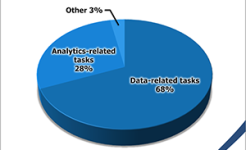-
Revolutionizing Medicine: 8 Innovative Applications of Machine Learning in Healthcare There has been a lot of hype around the applications of machine learning in medicine. But how is machine learning actually helping bench-to-bedside scientists and clinicians…
-
Which Technologies to Consider in Your Digital Transformation Strategy If your enterprise is about to undertake a digital transformation (Dx) project, you should understand that these initiatives require a focus on more than the technology itself. To succeed…
-
Cutting-Edge Chip Innovations Shape the Future of IT Strategies Technology never stands still, and computer chip innovations are no exception. It’s time to revisit IT’s strategic roadmaps for what’s coming. Fifty-eight years ago, Fairchild Semiconductor’s…
-
Six Common Challenges when Adopting a Data-Driven Approach Companies that embrace data-driven approaches stand to perform much better than those that don’t, yet they’re still in the minority. What’s standing in the way? It’s no surprise that becoming a…
-
The AI Dilemma: CIO Perspectives on Navigating the Right Path Forward Recent advances have highlighted AI’s incomparable potential and not yet fully fathomed risks, placing CIOs in the hot seat for figuring out how best to leverage this increasingly…
-
Business Automation: The Key Investment for CIOs In an increasingly challenging economic environment, it’s essential that chief information officers (CIOs) take a thoughtful approach to investing capital. The 2023 Gartner® CIO and Technology Executive Survey…
-
Mastering Data Governance: A Guide for Optimal Results With digital transformation initiatives on the rise, organizations are investing more in Data Governance, a formalized practice that connects different components and increases data’s value. Some may…
-
Improve the effectiveness of IT training by evading these seven mistakes With technologies rapidly advancing and evolving, organizations are recognizing the need to upskill IT staff. But poor training practices can lead to subpar team skills and competitive…
-
Riding the Wave of Digital Transformation: Five Top Trends and Two Outdated Approaches From supporting hybrid work to proliferating micro transformations across the enterprise, digital transformation tactics and strategies are constantly evolving — even the…
-
Recent study unveils lack of sound data infrastructure in healthcare organizations In the race to unearth enterprise insights, the modern health system is like a prospector whose land contains precious metals deep beneath the surface. Until the organization…
-
Enabling Data Stewardship to Improve Data Quality and Management at your Organization As we continue to do business in a digitally connected world, more data-driven organizations are prioritizing data stewardship to improve data quality and management. Data…
-
How the need for data contributes to the evolution of the CFO role The role of the CFO has evolved in recent years from the person in control of the purse strings, to the trusted right hand of the CEO. Their importance was further enhanced during the pandemic…
-
Part of a Multi-Cloud Organization? Be Aware of these Data Security Implications The world is going multi-cloud. Enterprises are leveraging the benefits of multi-cloud services to improve operational efficiency, reduce costs, and drive faster innovation. What…
-
A cloud outsourcing analysis: should your company consider it? Learn about outsourcing cloud computing, its pros and cons, and what to ask a provider. There are many benefits to cloud computing, including cost savings, flexibility, and scalability, and it’s a…
-
Recommendations for CIOs making the shift to a different industry From preparing for the hiring process to excelling in a new industry, IT leaders who have successfully switched to a new industry shed light on what it takes to make the shift. Technology today…
-
Why your copmpany should consider returning to the office Raise your hand if you miss commutes, your cubicle and the limited offerings of the break room vending machine. What, nobody? Two years after the pandemic's start, much of corporate America isn't ready…
-
5 Lessons for leaders aiming to disrupt their industry Being a disruptive leader takes vision, communication and balance. Here are five things I've learned as I've disrupted my industry. I am naturally a disruptive leader — someone who not only embraces…
-
What Does Being Data-Driven Really Mean? A F1 Racing Analogy Did you watch the Hungarian F1 race Sunday July 31st? Max Verstappen qualified 10th on Saturday but won the race. Lewis Hamilton started 7th and ended second. The pole sitter, George Russel ended up…
-
How enterprises can (try to) deal with cloud outages Better observability tools can help net managers maintain some resilience to cloud service outages, but provider misconfigurations and DNS infrastructure issues are out of their control. Over the last year…
-
The issue of employee reluctance when it comes to cybersecurity training Although 75% of all US and UK companies were exposed to cyber incidents in the past year, employees still hate cybersecurity training sessions. Considering most cyberattacks capitalize…
-
Useful advice for entrepreneurs who consider starting a microbusiness Right now, with inflation and interest rates rising, many aspiring entrepreneurs are reconsidering plans to launch new businesses. It is, they believe, the wrong time to go all-in on a new…
-
How organizations can control the carbon emissions caused by using the cloud The move to the cloud is not necessarily a carbon-free transition, which means businesses need to be folding cloud-based emissions into their overall ESG strategy. Cloud computing is…
-
Why it is key to teach your organization about data integrity Are you prepared for an attack on your data environment? A data integrity drill can determine the readiness of your enterprise to respond and recover. A lot has changed in the world of IT over the…
-
Being successful as a data-driven business through good IT management Data-driven businesses are far more successful than companies that don’t utilize data to their advantage. Unfortunately, they often find that managing their data effectively can be a…
-
Why agile IT will help organizations to overcome challenges Chief information officers’ focus should move to promoting a culture of agile thinking within IT and putting the priority on product-oriented projects. Speed and agility are key components of two…
-
The Benefits of Establishing a Data Culture Building a data culture isn’t just about having more people access data and making smarter decisions. A strong data culture is directly linked to a company’s revenue, as Ashley Womack, director of corporate…
-
5 Tips to increase the connectedness of your employees Helping your employees build workplace connections is critical if you want to attract and retain talent. People who feel like they belong and have workplace friendships are happier, healthier and more…
-
7 Tips to integrate new research technologies in your organization The pandemic has accelerated the adoption of emerging research technologies. However, it's important to consider not just your current needs but also what these technologies actually do. Here…
-
Hoe kunt u als klein bedrijf gebruik maken van business intelligence? Stelt u zich voor dat u geblinddoekt een pen moet zoeken zonder enige hulp of idee waar deze zou kunnen liggen. Dat is min of meer wat u doet wanneer u voor uw bedrijf geen gebruik maakt…
-
Key demands for modern Chief Information Officers As companies digitalize, they expect more than ever from their chief information officers. The movement of companies into a digital economy has redefined the role of the CIO. “The CIO’s role has always had…
-
Nederlanders vinden data in hun dagelijks werk essentiëler dan andere Europeanen Drie kwart van Nederlanders geeft aan data essentieel te vinden bij hun dagelijks werk. Hierin loopt Nederland voorop op landen zoals het Verenigd Koninkrijk, Duitsland en…
-
Achieving Business Success by Approaching Data Governance the Right Way Data analytics and AI play an increasingly pivotal role in most modern organizations. To keep those initiatives on track, enterprises must roll out Data Governance programs to ensure data…
-
A CIO perspective on the new hybrid organization IT leaders are looking at lessons learned from stopgap COVID workplace measures to establish intentional hybrid workplace strategies tailored for long-term success. As most CIOs see it, the distributed, hybrid…
-
7 tips to become a better CIO CIOs have long been viewed by many colleagues as second-string executives. Now is the time for IT leaders to expand their role, and to assert their unique vision and value. Being a CIO has never been more important. Major IT…
-
What are data silos and why are they problematic? Times are changing. We are breaking new thresholds in managing data. But getting rid of old habits is easier said than done. Data silos, an institutional phenomenon, are still mushrooming in today’s…
-
Measuring and managing sustainability for IT leaders How can IT leaders know if they’re tracking greenhouse gas emissions comprehensively? The introduction of AI and machine learning are painting a clearer picture. As companies attempt to take sustainability…
-
Your company needs a unique vision on the future, on multiple levels Does your organization have a unique point of view about the future? If your answer to the question is no, Gary Hamel says that you do not have a strategy. So, how does one establish their…
-
B2B companies and the Power of Purpose Most B2B companies focus on providing products and services to make money and create profit for shareholders. While profit is critical, it is no longer the sole purpose for companies. Instead, yielding to pressure from…
-
Combining human and artificial intelligence in a hybrid workforce As business bounces back, growing companies are running into the Great Resignation and struggling to hire employees quickly enough — especially skilled knowledge workers. But if the Great…
-
Building a base for successful AI with your data strategy For many years, the underlying complexities of AI, paired with a dramatic portrayal in the media as an inevitable replacement for human jobs, created a daunting narrative that made AI difficult for…
-
Context is key for organizations making data-driven decisions As organizations enter a new year, leaders across industries are increasingly collecting more data to drive innovative growth strategies. Yet to move forward effectively, these organizations need…
-
Building a successful startup by complying with the 5 T's The key areas for entrepreneurs to prioritize as they build their businesses from the ground up. Entrepreneurs’ jobs, goals and strategies will be different every quarter, if not day. You’re aiming to…
-
Sneller innoveren in IT? De belangrijkste overwegingen Als de gemiddelde organisatie iets heeft geleerd van de coronapandemie, dan is het wel dat IT wel degelijk snel kan innoveren als het echt moet. Dat brengt echter ook meteen de volgende uitdaging met zich…
-
Onboarding anno 2022: digitaal en toch persoonlijk Veel werk maar niet de mensen om het werk op te pakken. Voor veel bedrijven is het huidige tekort aan personeel inmiddels een echte uitdaging. En het mes snijdt aan twee kanten. Het is niet alleen een…
-
Become data-driven to improve data analytics skills across your organization It’s not a surprise that nearly every business leader wants their people to take more advantage of their data. Data-driven cultures promote customer and employee retention as well as…
-
The role of Centers of Excellence in the development towards data-driven organizations The CoE role is expanding to meet the demands of data democratization. Centers of excellence (CoEs) have an important and evolving role that can make their businesses…
-
Een webshop zonder fysieke winkel, mèt fysieke balie. Hoe zit dat? “We zijn geen winkel, we zijn een balie”. Algemeen directeur Pim Pernot maakt graag duidelijk waarin InstallatieBalie.nl verschilt. Online, maar wel met een fysieke balie. Hij vertelt er over…
-
Why being sustainable as an organization is a key concern for CFOs In recent years, corporate sustainability efforts have become an important and unavoidable concern for finance executives. Jon Chorley has seen this trajectory from a unique vantage point,…
-
Mulitalented IT performers: the paradox of versatility and role clarity Versatility is an admirable trait in any IT team member. But what happens when a manager allows staffers to stretch their talents too far? Many IT leaders admire a versatile employee.…
-
Brouwer AB InBev genereert extra omzet met DataRobot AI-platform AB InBev, de grootste bierproducent ter wereld, heeft het AI-platform van DataRobot geselecteerd. Het bedrijf gebruikt het platform onder meer om AutoML-modellen te ontwikkelen voor haar zes…
-
Google: a prime example of an intelligent organization basing its decisions on data Google is a company in which fact-based decision-making is part of the DNA and where Googlers (that is what Google calls its employees) speak the language of data as part of…
-
How business leaders can learn from firefighters The Firefighting Dichotomy When problems or crises arise in a business context, we often hear leaders refer to how busy their teams are firefighting. This paints a picture of chaos in the workplace, with…
-
Learning about Company Culture through Data Analytics Analytics is invaluable for data-driven businesses trying to create better company cultures by analyzing other businesses. Many companies refer to themselves as data-driven organizations. Unfortunately,…
-
How CIOs are learning from the COVID-19 pandemic to transform towards agile If the COVID-19 pandemic taught us anything, it’s that you can never be too prepared for change – fast-moving, come-out-of-nowhere change that transforms the way we run our…
-
The omnipresent challenge of collaborating effectively Whether talking about collaboration tools or just the idea of collaboration, at this point in time it should not be “news.” We’ve collaborated forever and the tools have been around for well over 20…
-
Leading your organization to success through Agile Data Governance Laura Madsen wants to challenge your outdated ideas about Data Governance. “I’m pretty sure that we wouldn’t use software that we used 20 years ago, but we’re still using Data Governance and…
-
What is Machine Vision and How Does it Help Businesses Grow? The idea of computers having eyes and a human-like brain is old news. And machine vision was the first to bring this sci-fi idea into being. This engineering discipline leverages evolving tech…
-
Implementing practices to keep up with developments towards data-driven and consumer-centric Corporate leaders tell us that the processes that, for decades, have framed the internal dealings of their firms are no longer tolerable, as they need to become…
-
Making your Organization more intelligent with a Cloud Data Strategy At a time when most major companies are showing a long-range commitment to “data-driven culture,” data is considered the most prized asset. An Enterprise Data Strategy, along with aligned…
-
Adopting Data Science in a Business Environment While most organizations understand the importance of data, far fewer have figured out how to successfully become a data-driven company. It’s enticing to focus on the “bells and whistles” of machine learning and…
-
Why it is key for leaders to infuse data and analytics into organizations Data and analytics are proving more important to companies’ strategies than ever before, according to a survey by Harvard Business Review Analytic Services. However, many organizations…
-
The Challenges of Moving to a Cloud Environment While no business could have fully prepared for the COVID-19 pandemic’s impact, those with strong cloud-based strategies have been able to adapt to the remote work reality. But even for companies that have…
-
Keeping the data of your organization safe by storing it in the cloud We now live within the digital domain, and accessing vital information is more important than ever. Up until rather recently, most businesses tended to employ on-site data storage methods…
-
Five challenges to overcome in order to improve sales productivity Many of the sales leaders we work with say they need to find ways to make their sales team more productive. It’s no wonder, given the constant pressure to deliver results. Sales leaders also…
-
Hoe zou een werkdag in 2030 eruit kunnen zien? Virtual reality, augmented reality, kunstmatige intelligentie, the internet of things. Toekomstmuziek of dichterbij dan je denkt? Managementbase vroeg Dennis Sigmond, EUC/IT Architect & Manager Business…
-
Why we must work together to gain safety and trust in the digital identity age As consumers across the globe become increasingly aware of their digital identity and personal data rights and further regulations take hold, it’s unsurprising that Google has…
-
7 competences to develop to become a successful CIO The days when CIOs could glide into a long-term career based solely on their technical abilities are rapidly fading. “It’s no longer enough for IT leaders to be tech experts,” warns Bob Hersch, a principal…
-
DataRobot benoemt Dan Wright tot Chief Executive Officer Leider in enterprise AI streeft naar verdere groeiversnelling na recordjaar DataRobot, leider in enterprise AI, heeft Dan Wright benoemd tot nieuwe Chief Executive Officer om de groei en adoptie van…
-
The evolution of the Data Executive Twenty years ago, no one had heard of a chief data officer. Now the position is central to C-suites in a majority of major companies (65% in NewVantage Partners’ 2021 survey). The rise in prominence of data executives goes…
-
Automating your organization in a couple of months through 4 steps Make automation a reality in the next 60 to 90 days Over the past three years, companies that scaled intelligent automation across their enterprises outperformed their peers in profitability,…
-
Veilig thuiswerken met behulp van 10 eenvoudige tips Biedt jouw organisatie thuiswerkmogelijkheden? Is je informatie voldoende beschermd? Passen de voorzieningen bij de maatregelen om veilig werken te garanderen? In deze blog staan 10 eenvoudige tips ten…
-
Using data successfully: the role of data democratization An effective culture to underpin your strategy A business that looks to become truly data-driven knows that employees are more likely to back the wider strategy if they have access to data that helps…
-
Diminishing stress related to technology for the people most important to your organization The excitement to adopt the smartest interface is pushing businesses to lose their focus on two important things: employees and customers. Your ability to become a…
-
How deeper employer - employee connections enhance individual and team performances Ever see something for the first time and then realize you see it everywhere? That happened to me over the last two weeks. 1936 U.S. Olympic Crew Team It started with the…
-
Helping your employees deal with change by communicating it the right way Last year, 70% of employees we surveyed indicated that they faced an increasing amount of change over the prior year. In addition, Communications executives identified employee change…
-
How SAS uses analytics to help with the covid-19 vaccination process The management of the COVID-19 vaccination program is one of the most complex tasks in modern history. Even without the added complications of administering the vaccine during a pandemic,…
-
Why mathematical optimization will help your organization Machine Learning may not be enough to get the best out of Data Science I will tell you the story of Adam*. Adam is a truck dispatcher, working in a distribution warehouse. His daily job is to assign a…
-
Building blocks to help you create the best possible IT team There are three key attributes high-functioning IT team members share that are identifiable in your initial interviews: Desire, willingness, and "teachability". There’s been a lot written about the…
-
5 Tips to maintain your business amid the challenges of 2021 The pandemic and everything related to it caught many business owners by surprise and, even worse, caused some businesses to fold The pandemic and everything related to it caught many business…
-
6 tips om Microsoft Teams succesvol te implementeren in je organisatie Vanaf het voorjaar van 2020 werken we, noodgedwongen, veel meer thuis. En hoewel thuiswerken de laatste jaren steeds normaler is geworden, waren er toch veel organisaties die daar niet op…
-
3 important considerations when strategizing digital transformation While business and IT leaders are under pressure to boost their digital transformation plans, they should stop, rethink, and assess before fully diving into a roadmap. The question all…
-
Hoe gestructureerd inwerken jouw bedrijf naar een hoger niveau kan tillen Heb jij het ook zo druk en hou je op het einde van de werkdag vaak nog wat werk over? Eigenlijk zou je wel een collega erbij willen hebben. Maar als die zich aandient, heb je dan wel…
-
3 Reasons to implement a data strategy in your sales processes Sales managers are resilient folk. For many, adapting to leaps in technology, economic volatility, and radical shifts in buying behavior is the norm. Often they emerge stronger and better equipped…
-
An overview of the Chief Data Officer role, past and present The role of Chief Data Officers (CDOs) in 2020 is evolving as CDOs are having quite possibly their most important and challenging year in their nearly two-decade existence to meet their…
-
How to manage your next project? Waterfall or agile? What is waterfall? Waterfall methodology, also known as the linear sequential lifecycle model, is defined by its linear, structured approach to project management. It is made up of a series of steps that…
-
How Greece set an example using online volunteering to battle COVID-19 Assistant Volunteer, a project of Nable Solutions, was born during the HackCoronaGreece online hackathon to better coordinate the efforts of volunteers. Today, Assistant Volunteer’s…
-
The challenge AI creates for IT and business leaders Artificial intelligence (AI) and AI-augmented data analytics have captured the imagination of everyone from kindergarten to the boardroom, as they change the ways we live, shop, consume news, and govern…
-
Covid-19 is speeding up all kinds of changes in business A recent survey of more than 200 enterprise business professionals confirms that Covid-19 is hastening both personal and business change across every industry. In a May 2020 survey conducted by…
-
The human impact of data literacy What if I told you only 32% of business executives said that they’re able to create measurable value from data, and just 27% said their data and analytics projects produce actionable insights? Let me put it another way: How…
-
Why startups are often cautious about investing in big data In recent years, the term Big Data has become the talk of the town, or should we say, the planet. By definition, big data analytics is the complex process of analyzing huge chunks of data, trying to…
-
How your organization can establish a results-based data strategy Money never sleeps and neither does your data. In this article, we look at digital transformation: the ways of turning data into new revenue streams and apps that boost income, increase…
-
The importance of ensuring AI has a positive impact on your organization Arijit Sengupta, founder and CEO of Aible, explains how AI is changing and why a single AI model is no longer smart business. There’s lots of buzz about artificial intelligence, but as…
-
5 Best practices to attract (and retain) talent for your organization By applying these best practices, you can bring on talent that keeps pace with innovation, shifting customer needs, and new technologies. It’s no secret that there is currently a massive…
-
Some expert advice on gaining organizational trust Take a moment and ask yourself, what is your definition of trust and how do you know when you are trusted? Did the answers come quickly, or not? If you don’t have a ready definition, don’t worry, most people…
-
Democratized software: a tool for all parts of a business We are witnessing the next wave of software: one that democratizes its use and allows all parts of a business to participate in making it work. My background in consulting gave me the opportunity to…
-
Gartner's nieuwjaarsresoluties voor CIO's in 2020 Voordat CIO's allerlei nieuwe initiatieven in het komende jaar gaan ontplooien, is het nuttig om zowel de mentale en fysieke ruimte op te ruimen om plek te creëren voor die nieuwe dingen, adviseert Gartner.…
-
How to translate IIoT investments to ROI A digital transformation takes time, sometimes a considerable amount. This means it can be difficult to quantify ROI, at least in the short term. Return on investment for IIoT (Industrial Internet of Things) relies…
-
How businesses can support citizen developers towards success It is estimated that by 2030, there could be a shortage of 10 million developers in the U.S., according to Forrester Research. This shortcoming, coupled with the proliferation of automation tools,…
-
Hoe zorg je voor een datacultuur in je organisatie? Organisaties met een duidelijke datacultuur zijn winstgevender dan bedrijven die dat niet doen. Maar waar is een datacultuur? En als je dat wilt, waar dan te beginnen? Alleen software installeren is niet…
-
Everyone wants to get more out of their data, but how exactly to do that can leave you scratching your head. Our BI Best Practices demystify the analytics world and empower you with actionable how-to guidance. Answering the big questions In the right hands,…
-
Data access: the key to better decision making When employees have better access to data, they end up making better decisions. Companies across sectors are already well in the habit of collecting relevant historical and business data to make projections and…
-
Is digitalization really capable of making your business paperless? In a recent survey, 79% of content management professionals admitted that more than a quarter of their organizations’ total records are still on paper documents. The same research also showed…
-
Aligning your business with your data team It’s important for everyone at a company to have the data they need to make decisions. However, if they just work with their data team to retrieve specific metrics, they are missing out. Data teams can provide a lot…
-
Why agile learning is essential to your business The digital deadlock is affecting many organizations today, big and small, and across all industries. Vast amounts of technology investments are being poured into the engines of aggressive digital strategies,…
-
Cognitive diversity to strengthen your team Many miles of copy have been written on the advantages of diverse teams. But all too often this thinking is only skin deep. That is it focusses on racial, gender & sexual orientation diversity. There can be a lot…
-
Digitale transformatie van B2B bedrijven: tips voor een roadmap Het opzetten van een digitale roadmap en het kiezen van technologie zijn al een uitdaging op zich. Maar de echte vraagstukken verschijnen pas wanneer je aan de slag gaat. Waar begin je? Hoe…
-
Why you should implement automation in your business When automation is done well, it accomplishes more than just saving time and money. It minimizes errors, improves productivity, increases employee satisfaction, and enhances the customer experience. When…
-
A guide to Business Process Automation Are you spending hours repeating the same tasks? Office workers spend 69 days a year on administrative tasks. You might be wishing for a simpler way to get those jobs done. An increasing number of businesses are relying…
-
Why your business should consider outsourcing its Internet of Things R&D There's a lot to know about the benefits of outsourcing your IoT (Internet of Things) R&D (research and development), especially as internet of things technology becomes more complex.…
-
How to be a digital leader in a time of large-scale technology transformation Following interviews with hundreds of industry executives, McKinsey recently shared fivecornerstones that are enabling organizations across every industry to integrate and…
-
De kracht van fysieke winkels als onderdeel van digitale strategie Met steeds meer vertrouwde merken die hun vestigingen sluiten, lijkt de fysieke winkel een uitstervend fenomeen. Niets is minder waar, maar een transformatie van die winkels is wel nodig,…
-
SAS: The importance of customer experience to keep improving as a company Did you know the first SAS® Users Group event took place before SAS was incorporated as a company? In 1976, hundreds of early SAS users gathered in sunny Kissimmee, FL to share tips and…
-
Het takenpakket van de CIO gaat ook customer experience omvatten De rol van de CIO verandert, dat weten we allemaal. Maar steeds vaker wordt de technologische leider ook leidend in het optimaliseren van de klantervaring. IT wordt steeds complexer en de rol…
-
Casestudy: how Skullcandy used BI and analytics for product improvement Skullcandy’s journey with advanced analytics started with the product development team daring to ask three big questions: What if we could predict return rates on new products before they…
-
Recommendations for transitioning your business to a hybrid cloud environment successfully Why move to the cloud, and if you do, how can you do so smoothly? BMC's Bill Talbot, VP for solutions marketing, shares some suggestions for making a successful…
-
What does Agile mean to your organization? Today it is almost 'bon ton' to talk about being 'Agile'. It is as if the word is written on billboards along every road you take: if you want innovations, be Agile; if you want to understand your clients, be Agile; if…
-
How big data can help your business design its letterhead Big data can pave the way for major improvements in the quality of company letterhead designs. Here's how that can happen. Big data has been at the forefront of the design industry for years. A number…
-
Is de multicloud een reden voor de langzame adoptie van AI bij organisaties? Ondanks de enorme potentie verloopt de adoptie van AI relatief langzaam. Volgens Efrym Willems, Business Development IBM Watson, Analytics, IoT & IBM Cloud bij Tech Data, is de…
-
Rabobank: Zelfontwikkeling binnen IT door combinatie technologie en cultuur 'We geven we de mensen een eigen verantwoordelijkheid, daar hebben we vertrouwen in' Rabobank stelt zijn IT-medewerkers in staat zelf hun ontwikkeling in eigen hand te nemen door de…
-
Forrester: Insights to help prepare your organization for 5G 5G Presents immense innovation potential 5G promises to usher in not just new use cases in every industry but also new business models. Some of the most relevant use cases across industries, such as…
-
Welke vaardigheden maken een CIO succesvol? De best presterende CIO’s richten zich meer op leiderschap, klantdoelen, werknemers en andere bedrijfsfuncties, dan op technologie. Dit blijkt uit onderzoek van ServiceNow. Invloed in de boardroom, focus op klanten…
-
Hoe zorg je voor succesvolle digitalisering als B2B bedrijf? Binnen B2C is digitaal de gewoonste zaak van de wereld, voor B2B geldt dat minder. Veel bedrijven tonen naar de buitenwereld een digitaal gezicht. Bestaande ERP-systemen laten zich echter moeilijk…
-
Tech companies and the issue of diversity Diversity in the workplace is something that all tech companies should strive for. When appropriately embraced in the tech sector, diversity has been shown to increase financial performance, increase employee…
-
Back to the essence of human-to-human marketing While multiple sessions at this month’s Cannes Lions international festival of creativity looked at harnessing data and artificial intelligence, B2B International has been conducting some pretty interesting…
-
Pyramid Analytics: Main lessons learned from the data-driven drilling and production conference It was great to be at the data-driven drilling and production conference in Houston on June 11 and 12. The conference was well attended by hundreds of oil and gas…
-
Transformeren doe je als gehele organisatie, niet alleen digitaal ‘Transform or die’, klinkt het tegenwoordig. Maar slechts een klein deel, vijf procent, van de digitale transformaties slaagt. De reden: het doel van de verandering is niet duidelijk. Dat is te…
-
Gartner: US government agencies falling behind digital businesses in other industries A Gartner survey of more than 500 government CIOs shows that government agencies are falling behind other industries when it comes to planned investments in digital business…
-
The risk of undervaluing creativity Agencies’ creative perspective, the very currency of the business, is at risk and can only be realized by shifting billions from tech to fund creative differentiation. “The value of agency creativity is at risk of…
-
What to keep in mind when recruiting the right data scientist As a relatively new role, 'data guru' is a challenging job specification to draft for. Organisations are seeking highly-skilled and well-educated individuals to fulfil the position, but the truth…
-
Using big data to improve as a manufacturer Here's how to implement manufacturing analytics today, in a world where big data, business intelligence, and artificial intelligence are steadily expanding. Big data is everywhere, and it’s finding its way into a…
-
Making AI actionable within your organization It can be really frustrating to run a successful pilot or implement an AI system without it getting widespread adoption through your organization. Operationalizing AI is a really common problem. It may seem that…
-
Measuring data maturity: How data-driven is your business? With the number of data-driven businesses in decline and the number of legacy businesses being disrupted on the up, we wanted to create a deeper understanding of what it actually means to be…
-
Continuous improvement requires continuous intelligence Business leaders must take the initiative to leverage their data using new technologies and approaches to adapt and succeed in the digital world. The digital age has presented businesses with a…
-
Integrating security, compliance, and session management when deploying AI systems As enterprises adopt AI (artificial intelligence), they'll need a sound deployment framework that enables security, compliance, and session management. As accessible as the…
-
Using the right workforce options to develop AI with the help of data While it may seem like artificial intelligence (AI) has hit the jackpot, a lot of work needs to be done before its potential can really come to life. In our modern take on the 20th century…
-
The 5 dimensions that help your business with a successful technological transformation Businesses that have mastered the ability to change quickly share one common denominator: technology is transforming their business. Technology can be a transformative…
-
Dare to disrupt with technology-driven innovation Clients never tell their business wants to be an also-ran. Everyone wants to dominate their market and is searching for the competitive advantage that helps them do it. The drive for leadership is why growth,…
-
In een intelligente organisatie is er altijd plaats voor een chatbot in HR Mensen vormen het hart van een bedrijf, en de afdeling Human Resources is er om voor die mensen te zorgen. HR is de bewaker van de cultuur en zorgt dat werknemers mogelijkheden krijgen…
-
The increasing impact of AI on cinemas Artificial Intelligence (AI) has become a giant in the tech industry and is transforming the workforce as we know it in all kinds of ways. Everything from transportation manufacturers to home appliance companies is using…
-
How to improve your business processes with Artificial Intelligence? In the age of digital disruption, even the world’s largest companies aren’t impervious to agile competitors that move quick, iterate fast, and have the capacity to build products faster than…
-
Ethical Intelligence: can businesses take the responsibilty? Adding property rights to inherent human data could provide a significant opportunity and differentiator for companies seeking to get ahead of the data ethics crisis and adopt good business ethics…
-
De essentie van de juiste digitale infrastructuur voor jouw bedrijf Technologie ontwikkelt zich heden ten dage sneller dan ooit en veel bedrijven hebben moeite om bij te blijven. Dat vormt een probleem, want het effectief kunnen toepassen van technologie is…
-
The most wanted skills related for organizations migrating to the cloud Given the widespread move to cloud services underway today, it’s not surprising that there’s growing demand for a variety of cloud-related skills. Earlier this year, IT consulting and…
-
MicroStrategy: Take your business to the next level with machine learning It’s been nearly 22 years since history was made across a chess board. The place was New York City, and the event was Game 6 of a series of games between IBM’s “Deep Blue” and the…
-
The 5G revolution: Perks and early uses for your business The much-awaited revolution is nearly here While the 5G PR machinery has been on a roll for a while now, there’s finally a clear picture of when exactly we can expect the technology to hit our shores:…
-
How to act now to be successful in the future? Digital business models Digital business models created around data are producing a winner-take-all market, not a digital divide. That’s why leaders need to “stop doing analytics for analytics’ sake, focus on the…
-
How employee personas can help to improve productivity within organizations The importance of staff engagement and morale in the workplace of an organization Companies are becoming more crowded with communal factors across the board, often advertising similar…
-
Data management: building the bridge between IT and business We all know businesses are trying to do more with their data, but inaccuracy and general data management issues are getting in the way. For most businesses, the status quo for managing data is not…
-
AI omzetten in een succesvolle strategie: 8 tips voor marketeers Artificial Intelligence (AI) zou het belangrijkste aspect moeten zijn van een datastrategie. Dat vindt meer dan 60 procent van de marketeers, blijkt uitonderzoek van MemSQL. Maar het…
-
Learning from the financial reports of your business: 3 important questions to ask Your business’s financial reports should help you make important business decisions. While there are many smart decisions you’ll be able to make with efficient reports by your…
-
5G Technology and its possible business opportunities With 4G technology dominating the wireless networks of the present, a successor is emerging in the form of 5G technology. 5G is expected to replace 4G technology and dominate the wireless networks of the…
-
Imagine being able to communicate effortlessly with the devices around you. This means having your devices fully automated and connected by sharing data through the use of sensors. This will definitely improve the quality of life and make our day to day…
-
Inventory management software can make a big difference in helping to decrease your inventory gap and boost your profit. Here's what to know: You know better than anybody how many variables are in play during an average day in warehouse and inventory…
-
Gedreven door technologie en toenemende transparantie-eisen groeit finance uit tot het dataknooppunt van de organisatie. Hoe werkt dat in de praktijk? Drie CFO's bieden een blik achter de schermen. De finance-functie moderniseert. Met real-time analytics,…
-
Getting a successful business up and running is a key skill for entrepreneurs. Building a team that can take it to the next level is another; and some might say, one of the most difficult to master. The people they need to bring on board must be at ease with…
-
As the founder of a company, you’ve learned to expect to lose people, often your best people, and grin and bear it when your star performer tells you she’s moving on. You go through the steps of trying capture some of the institutional and project knowledge…
-
Knowledge is power. The more you know, the better equipped you are to handle and control events. But given how much information organisations have to deal with on a daily basis, managing all of this data can prove troublesome. The rate at which information…
-
Bedrijven met een datagedreven organisatiecultuur plukken daar de vruchten van. De voordelen van data inzet zijn bij de meeste bedrijven wel bekend, echter blijft de implementatie vaak achter. Op zich niet verrassend: de overgang op verschillende…
-
Stéphane Hamel deed op 21 januari de High Tech Campus in Eindhoven aan: dé kans voor een flinke dosis inspiratie door één van ’s wereld meest vooraanstaande denkers in digital analytics. Hamel lichtte op digital maturity day 2016 (#DMD2016) het Digital…
-
By now you’ve surely heard that moving forward, every company will be a software company, and that shift is happening now as companies large and small scramble to transform into digitally-driven organizations. Wherever you turn, businesses are facing…
-
Just think what $48 billion could buy. In the private sector, that could buy a lot of R&D and innovation; the lifeblood of a successful and growing economy. In the public sector, think of the boost it could give to education, healthcare and defence. What is…
-
From gene mapping to space exploration, humanity continues to generate ever-larger sets of data — far more information than people can actually process, manage, or understand.Machine learning systems can help researchers deal with this ever-growing flood of…
-
In mid-2014, a pair of Gartner analysts levied some trenchant criticisms at the increasingly hyped concept of data lakes. "The fundamental issue with the data lake is that it makes certain assumptions about the users of information," said Gartner research…
-
The global business intelligence market report, an analyst says In the past few years, social media has played critical roles in SMEs and mid-sized organizations. Many SMEs are increasingly embracing this trend and integrating their BI software with social…
-
Big data is the buzzword of the century, it seems. But, why is everyone so obsessed with it? Here’s what it’s all about, how companies are gathering it, and how it’s stored and used. What is it? Big data is simply large data sets that need to be analyzed…
-
Consider these scenarios: A low-level IT systems engineer spills soda, which takes down a bank of servers; a warehouse fire burns all of the patient records of a well-regarded medical firm; a government division’s entire website vanishes without a trace. Data…
-
Nederlanders zijn goed op de hoogte van hoe bedrijven en instellingen persoonlijke gegevens verzamelen en gebruiken. Ook zijn Nederlanders van alle Europeanen het meest bereid om persoonlijke gegevens te verstrekken in ruil voor gratis online diensten. Dat…
-
The computer industry moves in waves. We're at the tail end of one of those waves — the mobile revolution. What's next? Robots. But not the way you think. The robot revolution won't be characterized by white plastic desk lamps following you around asking…
-
Big data has reshaped businesses in many ways, and now it's even changing the way HR monitors employee engagement to improve both retention and customer satisfaction. What if your HR department could use data to not only predict employee engagement, but also…
-
The European Union is considering whether the way large Internet companies, such as Alphabet Inc.’s Google or Facebook Inc., collect vast quantities of data is in breach of antitrust rules, the bloc’s competition chief said Sunday. “If a company’s use of data…
-
We have been developing a new competitive intelligence process for a client. The B2B company wants to better collect, analyze, and disseminate valuable insights on competitive strategy. As with many competitive intelligence systems, especially in B2B…
-
Een onderwerp dat veel meer aandacht krijgt in de 2015 normering is de oriëntatie op de externe context waarin de organisatie opereert. Welke eisen en verwachtingen hebben de stakeholders van de organisatie? Interne en externe risicofactoren moeten worden…
-
Suggesting that the digital marketing landscape has grown complex and fragmented is like saying that the universe is vast beyond description. Nobody (save for the astronomer, anyway) will argue with you. Truth is, sometimes considering the range of available…
-
Big Data wordt gezien als de toekomst van onderzoek en dienstverlening. De economische belofte is groot. Vanuit die optiek proclameren consultancybedrijven regelmatig dat je als bedrijf nu op de Big Data-trein moet springen, of anders over 5 jaar 'out of…
-
Internet of Things technology is a hot topic. You can’t read a tech news site without coming across at least one mention of IoT. But if you’re looking to take advantage of sensors, you will likely have to update your data store to handle the workload. Once…
-
The Global Business Intelligence and Analytics Software Market is poised to grow at a CAGR of around 7.7% in the next 5 years to reach approximately $24 billion by 2020. This industry report analyzes the global markets for Business Intelligence and Analytics…
-
More and more businesses are waking up to the importance of data as a strategic resource. Yesterday, research released by the Economist Intelligence Unit reported that 60% of the professionals they quizzed feel that data is generating revenue within their…
-
Het Verkenningsinstituut voor Nieuwe Technologie (VINT) van Sogeti trapt het nieuwe jaar af met de ontwikkeling van vier onderzoeksrapporten over ‘machine intelligence’. Deze allesomvattende term voor kunstmatige intelligentie adresseert volgens VINT de…
-
Today, the customers’ expectations are growing by leaps and bounds and the credit goes to the technology that has given ample choices to them. Retailers are leaving no stone unturned to provide better shopping experience by adapting to analytical tools to…
-
As firms face growing competition for customers, they naturally seek to compare themselves with their peers and competitors, but there is a trap: Leaders don’t compare themselves. In the past, it was common to benchmark organizational performance against…
-
Get ready to work alongside smart machines At Narrative Science, we love making predictions about innovation, technology and, in particular, the rise of artificial intelligence. We may be a bit too optimistic about the timing of certain technologies going…
-
Companies across industries face some very common scenarios when it comes to getting the most value out of data. The life science industry is no exception. Sometimes a company sets out to improve business intelligence (BI) for a brand, division or functional…
-
It’s a no-brainer that good customer service experiences boost satisfaction, loyalty, and can influence top line revenue. Good service — whether it’s to answer a customer’s question prior to purchase, or help a customer resolve an issue post-purchase should…
-
Microsoft presenteert een nieuwe big data oplossing op basis van de computercode R en de technologie die het binnenhaalde bij de overname van bedrijf Revolution Analytics. Technologiereus Microsoft heeft een nieuw geavanceerd analytics platform onthuld op…
-
The history of artificial intelligence has been marked by seemingly revolutionary moments — breakthroughs that promised to bring what had until then been regarded as human-like capabilities to machines. The AI highlights reel includes the “expert systems” of…
-
Datagedreven opereren? Bij de meeste bedrijven zijn de datatoepassingen nog relatief simpel en vooral gericht op analyse in plaats van real-time en voorspellingen. Een gemiste kans én risico voor de lange-termijnkoers van een organisatie. Nu al zegt 22…
-
It’s been an interesting year for BI – and 2016 looks set to be no different Here are some predictions on what we believe next year has in store, in particular for the data and analytics industry. 1. Cannibalisation of the channelNext year will see many…
-
Het ‘Big’ in Big Data staat voor velen alleen voor de grote hoeveelheden data die organisaties in huis hebben. Die data lijken in veel praktijkvoorbeelden vooral voedingsbodem voor aanscherping van verdienmodellen – zoals in de advertentie-industrie – of…
-
December is traditiegetrouw de periode van het jaar om terug te blikken en oudjaarsdag is daarbij in het bijzonder natuurlijk de beste dag voor. Bij Numrush kijken we echter liever vooruit. Dat deden we begin december al met ons RUSH Magazine. In deze Gift…
-
Big Data is increasingly being used by prominent companies to outpace the competition. Be it established companies or start-ups, they are embracing data-focussed strategies to outpace the competition. In healthcare, clinical data can be reviewed treatment…
-
Business intelligence (bi) werd door Gartner al benoemd tot hoogste prioriteit voor de cio in 2016. Ook de Computable-experts voorspellen dat er veel en grote stappen genomen gaan worden binnen de bi. Tegelijkertijd moeten managers ook terug kijken en…
-
A roundup of big data and analytics predictions and pontifications from several industry prognosticators. At the end of each year, PR folks from different companies in the analytics industry send me predictions from their executives on what the next year…
-
Every minute of every day, mind-blowing amounts of data are generated. Twitter users send 347,222 tweets, YouTube users upload 300 hours of video, and Google receives more than four million search queries. And in a single hour, Walmart processes more than a…
-
Experts doen voorspellingen voor 2016 In 2016 staat veel te gebeuren op het vlak van privacy en dataprotectie. Hoewel de discussie ‘security versus privacy’ dit jaar al is begonnen, barst deze in 2016 echt los. Computable-experts bespreken verschillende…
-
Artificial intelligence is one of the most exciting and transformative opportunities of our time. From my vantage point as a venture investor at Playfair Capital, where I focus on investing and building community around AI, I see this as a great time for…
-
The previous article presented an introduction SQL and NoSQL. This article builds on these topics by reviewing six of the top performance metrics to capture to assess the health of your database in your enterprise application. Specifically this article…
-
Big data has come to advertising. Marketers use computers and algorithms to collect and analyze reams of data on customer behavior. That information is funneled into sophisticated software that can, in real time, adjust online ad design to the preferences of…
-
Digitale volgsystemen De ‘smart city’ is een belofte om leefbaarheid te verbeteren, ook in Nederlandse steden. Maar uit recent onderzoek blijken grote valkuilen. Bepaalt straks een algoritme welke wijkbewoners een gevaar zijn? Hudson Yards is nu nog de…
-
Geopolitieke ontwikkelingen, zoals internationale conflicten of politieke gevoeligheden, hebben een grote invloed op de digitale veiligheid in Nederland. Dat stelt staatssecretaris Klaas Dijkhoff in een rapportage die hij gisteren naar de Tweede kamer zond.…
-
Researchers in recent years have exhaustively catalogued and chronicled the biases that affect our decisions. We all know the havoc that biased decisions can wreak. From misguided beliefs about the side effects of vaccinating our children, to failures in…
-
There’s no doubt that gathering competitive information is challenging for any product manager, particularly if your competitors are small private companies or you have no budget. You may have already done the obvious - scoured the competitor’s website,…
-
Microsoft is placed furthest in vision and highest for ability to execute within the Leaders Quadrant. With the release of SQL Server 2014, the cornerstone of Microsoft’s data platform, we have continued to add more value to what customers are already buying.…
-
There is no question that the media industry is experiencing dramatic disruption on many fronts—in the way it creates content, distributes content to consumers, and monetizes audiences. These changes are driven by seismic shifts in consumer behavior and an…
-
The future of mobility. How transportation technology and social trends are creating a new business ecosystem Will technological advances and shifts in social attitudes lead to our no longer owning or driving vehicles? The global auto industry's…
-
“‘You’ve been Ubered’ will become part of our lexicon to describe industries blindsided by the future,”says Tony Chapman, a Canadian consumer and branding expert, in reference to the challenges that “Big Taxi” is currently facing due to the growing popularity…
-
For a site that only requires 140 characters to get your message across, there is a lot of confusion about how to effectively use Twitter to monitor competitors, and how to analyze that information to create an awesome social media strategy. Competitive…
-
Ever get the feeling that you’re being watched? If you do, you’re not paranoid. It’s likely your competitors are watching your every move with new technology that will give you a shear wake up call. Following the old adage of keeping your enemies closer,…
-
Wie benader je om conversie te verhogen of churn te verlagen? Over welke kanalen verdeel je je marketingbudget? Ontwikkel je een dure brochure of ga je voor een goedkoper kanaal als e-mail? Vragen die je als marketeer stelt bij het opstellen van een nieuwe…
-
The CIO focus on business intelligence (BI) and analytics will likely continue through 2017, according to Gartner Inc. The research firm says the benefits of fact-based decision-making are clear to business managers in a broad range of disciplines, including…
-
M. Zaman already stated a view years ago: the market is witnessing an unprecedented shift in business intelligence (BI), largely because of technological innovation and increasing business needs. The latest shift inthe BI market is the move from traditional…
-
Data is er te over in de hedendaagse marketingomgeving. Het doen van onderzoek naar klanten en con currenten was nog nooit zo laagdrempelig en directe feedback uit veel verschillende gelederen van de organisatie is ook laagdrempelig beschikbaar, nu bijna alle…
-
9 Juli 2015 Big data isn’t what it used to be. Not because firms are disillusioned with the technology, but rather because the term is no longer helpful. With nearly two-thirds of firms having implemented or planning to implement some big data capability by…
-
I saw it coming last year. Big data isn’t what it used to be. Not because firms are disillusioned with the technology, but rather because the term is no longer helpful. With nearly two-thirds of firms having implemented or planning to implement some big data…
-
-
Without proper analytics in place, many cloud services customers are wasting resources, struggling with compliance and suffering from outages and unexpected costs, according to a new study from Forrester Research. The study, sponsored by enterprise cloud…
-
IBM’s Vision user conference brings together customers who use its software for financial and sales performance management (FPM and SPM, respectively) as well as governance, risk management and compliance (GRC). Analytics is a technology that can enhance each…
-
Until recently big data was focused on processing massive amounts of simple, flat data. But now, there is a gr owing need to fuse complex data that comes from both inside and outside of organizations. This evolution is driving the need for new, less expensive…
-
In this post I outline how US agricultural manufacturer John Deere has transformed itself from a traditional manufacturing company to a big data leader. The post was first published in my column for Data Science Central. John Deere has always been a…
-
Technology can help HR fix the people thing by allowing them to do the ‘simple but difficult’ things better and on a broader scale. It isn’t about doing ‘clever’ things. For example, technology should be used to help a people manager select the person they…
-
Competitive intelligence is crucial to business success To maintain a competitive edge in business, you've got to keep a close eye on the competition. That's why access to competitive intelligence is critical to the success of your organization. Your…
-
Overview of MI Tools needed! Organisations with access to the right market information at the right time have the power to transform themselves into successful market leaders while companies that don’t have access to accurate and current information are…
-
-
-
Tekst volgt.
-
Uit onderzoek van Forrester in opdracht van Xerox komt naar voren dat bijna driekwart van de Europese ondernemingen veel rendement verwacht van Big Data en analytics. Voor het onderzoek werden gesprekken gevoerd met 330 senior business- (CEO, HR, Finance en…
-
De marktaandelen voor business intelligence software verschuiven licht. En één partij is duidelijk marktleider in Belgie. Dat blijkt uit onderzoek naar aanleiding van het gratis seminar over BI & analytics door Smart Business. SAP is binnen de onderscheiden…
-
Working together, both serve an important purpose in today’s ever-changing and increasingly competitive business environment performance In today’s fast-paced business world, the sheer number of terms (and their associated acronyms) is enough to baffle even…
-
De hipste nieuwe IT-banen In Silicon Valley wordt heftig geconcurreerd om het schaarse talent. De nieuwe beloningsnorm voor engineering toptalent in it is een miljoen dollar bij een vierjarig commitment. Dat soort bedragen halen we hier nooit, maar ook hier…
-
Making Content Marketing Work Speeds & feeds. “Hero” shots. Print ads. Product placement. Really expensive TV advertisements featuring celebrity endorsements. Pitching a product and service back when those phrases dominated marketing and advertising…
-
BI and Big Data: Same or Different? Webster dictionary defines a synonym as "a word having the same or nearly the same meaning" or as "a word or expression accepted as another name for something." This is so true for popular definitions of BI and big data.…
-
Organisaties kunnen op tal van terreinen nog winnen aan intelligentie. Afhankelijk van de definitie van intelligentie (een intelligente organisatie is echt iets anders dan dingen gewoon slim doen) kunnen we bijvoorbeeld ook veel intelligenter HRM bedrijven.…
-
Volgens een Onderzoek van Accenture hebben bedrijven hoge verwachtingen van de toegevoegde waarde die Big Data analytics kan hebben voor het optimaliseren van hun supply chain. Volgens dat zelfde onderzoek heeft echter slechts 17% van de onderzochte bedrijven…
-
Agnihotri, Raj (2013). How Competitive Rumors and Customer Insights Empower the Sales Force to Grow Market Share. 16 slides. Alexander, Jennifer (2012). What is CI? An Introduction to Competitive Intelligence in the Law Firm Environment. 23 slides. Allison,…
-
Asking the right question. “We hear only those questions for which we are in a position to find answers.” – (attributed to) Friedrich Nietszche I’ve been thinking about what it is that makes competitive intelligence a unique endeavor, particularly since the…
-
ExtinctHere's what you didn't learn in school about the disruption affecting retail today. A recent article by consultant Chris H. Petersen, "Seven disruptive trends that will kill the 'dinosaurs of retail'" discussed the fate of "25 retail dinosaurs that…
-
In this article, you'll learn...• How to gain competitive intelligence from public sources• Tools to monitor online advertising and SEO tactics of their competition Marketers want to know what their competition is up to. Setting up Google Alerts and following…
-
Hier komt de lijst met BI literatuur.
-
Wij zijn een open gemeenschap en staan open voor partnerships met verschillende partijen. Kunt u relevante content leveren (persberichten, aankondigingen, publicaties, best practices etc) neem dan contact met ons op via info@bi-kring.nl
-
OPLEIDINGEN Www.BI-kring.nl voorziet in een actuele agenda met relevante opleidingen en seminars op het gebied van Market, Competitive en Busines Intelligence. Wilt u uw opleiding opgenomen zien? Ga naar de site en upload de gegevens van uw opleiding of neem…
-
BC (Business & Competitive) Intelligence Business Intelligence is zo´n begrip dat zich nauwelijks letterlijk laat vertalen. Bedrijfsintelligentie zou in de buurt kunnen komen, maar valt net als andere vormen van intelligentie moeilijk precies te duiden.…
-
Have you ever suffered from Analysis Paralysis? That lost-in-the-weeds panic you get when you spend so much time overthinking a situation that you’re unable to act on it? A good BI plan provides you and your company with information that will enable it to…
-
SEMINARS Www.BI-kring.nl voorziet in een actuele agenda met relevante seminars en opleidingen op het gebied van Market, Competitive en Busines Intelligence. Wilt u uw opleiding opgenomen zien? Ga naar de site en upload de gegevens van uw opleiding of neem…
-
www.BI-kring.nl heeft een grote bibliotheek met relevante artikelen, cases, blogs, columns en demo’s op het vakgebied. Deze bibliotheek wordt dagelijks aangevuld en uitgebreid. We hebben de bibliotheek geordend naar de verschillende perspectieven die er op…
-
BI-kring staat voor Benelux Intelligence kring. BI-kring is een Kennisplatform. Doel van dit kennisplatform is bij te dragen aan de professionalisering van de vakgebieden Business-, Market- en Competitive Intelligence. BI-kring wil bijdragen aan de…
-
BI-kring staat midden in het Intelligence landschap. Wij kennen de opleidingen, dienstverleners, product leveranciers, goeroe's, thema's en mensen. Wij zijn een open gemeenschap en staan open voor partnerships met verschillende partijen. Kunt u relevante…
-
dasadasd
-
Data-driven insights can be invaluable for businesses – and improve financial inclusion in a world where 2.5 billion people still have no access to financial services Relevance and personalisation are delivered by data-driven insights; this is one of the new…
-
Google is van plan telecomdiensten aan te gaan bieden in de Verenigde Staten, via de mobiele netwerken van de telecombedrijven Sprint en T-Mobile US. Dat meldden ingewijden rond Google. Google zou al afspraken gemaakt hebben met Sprint en T-Mobile US over het…
-
Hans Wanders wordt per 1 maart 2015 de nieuwe CIO Rijk bij het ministerie van Binnenlandse Zaken en Koninkrijksrelaties. Wanders volgt in deze functie Maarten Hillenaar op, die per 1 januari vertrok. Als CIO Rijk bekleedt Wanders eveneens de functie van…
-
HeDe kans is groot dat de wereld binnenkort niet alleen wordt bevolkt door miljarden mensen, maar ook door miljarden robots. De IT-industrie wordt het terrein voor bedrijven die programma's ontwikkelen voor deze robots. Net zoals de nu voor menselijke…
-
CMOs will drive marketing technology spending to $32.3B by 2018, reaching a compound annual growth rate (CAGR) of 12.4%. From 2014 to 2018, marketing technology spending will reach $130B for the 5 year period. These and other insights are from IDC’s recent…
-
Today, businesses have had yet another function added to their portfolio – they are managers of a large amount of data and information. Big data has become a massive phenomenon created from the sheer amount of information captured from online and offline…
-
FreePint, the international research and consulting service for information and knowledge professionals, released an independent product review of Intelligence Plaza today. The Intelligence Plaza is a comprehensive web-based market and competitive…
-
Valutaire tegenwind, het afstoten van bedrijfsonderdelen en lagere marges in groeisegment de cloud hebben de omzet van IBM op bijna alle fronten doen dalen. Maar IBM hield wel meer over aan zijn bedrijfsactiviteiten IBM rapporteerde over het vierde kwartaal…
-
81% of CEOs see mobile technologies for customer engagement as the most strategically important in 2015. 80% see data mining and analysis technologies as the most strategically important, followed by cybersecurity (78%), Internet of Things (IoT) (65%),…
-
Pink Elephant en 2foqus gaan per januari 2015 een strategische samenwerking aan op het gebied van business intelligence (BI). De huidige BI-afdeling van de ict dienstverlener wordt samen met het team van 2foqus samengebracht in een nieuwe business…
-
As the big data analytics sector rapidly matures, companies will be increasingly asking what they can get out of the technology this year. And one of the big trends for 2015 will be companies aiming to move beyond a reactive approach to data to a more…
-
-
-
Kijk hier eens voor de mooie trends. Klik hier voor de publicatie Bron: BI landschap, 24 december 2014
-
De NAVO ziet zich geconfronteerd met uitdagingen die nog jaren zullen voortduren. Het zijn de grootste uitdagingen in meer dan 20 jaar. Dat zei vertrekkend NAVO-topman Anders Fogh Rasmussen maandag tijdens een afscheidstoespraak in Brussel. Zijn speech voor…
-
Lorem ipsum dolor sit amet, consectetur adipiscing elit. Duis tincidunt scelerisque purus, at lacinia libero condimentum ac. Donec velit orci, pellentesque ut justo vitae, sodales tristique neque. Sed ut scelerisque diam. Duis nec metus quis felis euismod…
-
Enige tijd geleden twitterde ik niet zonder aanleiding: ‘Bedrijfsbeslissingen op basis van Informatie? Ondanks alle investeringen in BI en IT lijkt het wel of de emotie juist terrein wint’. In een retweet gaaf Daan van Beek aan ‘door informatie kan de…
-
Business Intelligence Data Science Market & Competitive Intelligence Intelligente Organisatie



































































































































































































































